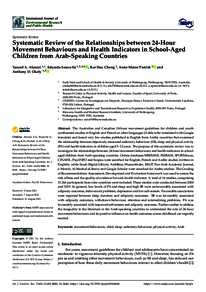وثيقة
Systematic review of the relationships between 24-hour movement behaviours and health indicators in school-aged children from Arab-speaking countries.
المعرف
DOI: 10.3390/ijerph18168640
المصدر
International Journal of Environmental Research and Public Health. v. 18, 16, 8640
المساهمون
الدولة
Switzerland
الناشر
MDPI.
ميلادي
2021-08-02
اللغة
الأنجليزية
الملخص الإنجليزي
The Australian and Canadian 24-hour movement guidelines for children and youth synthesized studies in English and French or other languages (if able to be translated with Google translate) and found very few studies published in English from Arabic countries that examined the relationship between objectively measured sedentary behaviour (SB), sleep and physical activity (PA) and health indicators in children aged 5–12 years. The purpose of this systematic review was to investigate the relationships between 24-hour movement behaviours and health indicators in school-aged children from Arab-speaking countries. Online databases MEDLINE, EMBASE, SPORTdiscus, CINAHL, PsycINFO and Scopus were searched for English, French and Arabic studies (written in English), while Saudi Digital Library, ArabBase, HumanIndex, KSUP, Pan-Arab Academic Journal, e-Marefa, Al Manhal eLibrary and Google Scholar were searched for Arabic studies. The Grading of Recommendations Assessment, Development and Evaluation framework was used to assess the risk of bias and the quality of evidence for each health indicator. A total of 16 studies, comprising 15,346 participants from nine countries were included. These studies were conducted between 2000 and 2019. In general, low levels of PA and sleep and high SB were unfavourably associated with adiposity outcomes, behavioural problems, depression and low self-esteem. Favourable associations were reported between sleep duration and adiposity outcomes. SB was favourably associated with adiposity outcomes, withdrawn behaviour, attention and externalizing problems. PA was favourably associated with improved self-esteem and adiposity outcomes. Further studies to address the inequality in the literature in the Arab-speaking countries to understand the role of 24-hour movement behaviours and its positive influence on health outcomes across childhood are urgently needed.
ISSN
1661-7827
URL المصدر
قالب العنصر
مقالات الدوريات

